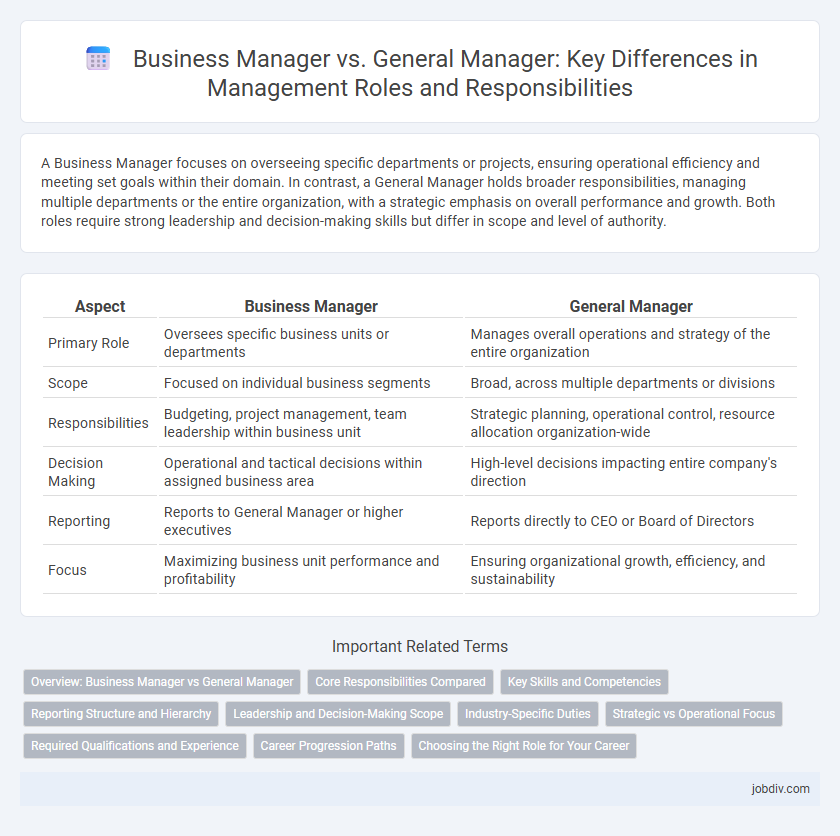A Business Manager focuses on overseeing specific departments or projects, ensuring operational efficiency and meeting set goals within their domain. In contrast, a General Manager holds broader responsibilities, managing multiple departments or the entire organization, with a strategic emphasis on overall performance and growth. Both roles require strong leadership and decision-making skills but differ in scope and level of authority.
Table of Comparison
| Aspect | Business Manager | General Manager |
|---|---|---|
| Primary Role | Oversees specific business units or departments | Manages overall operations and strategy of the entire organization |
| Scope | Focused on individual business segments | Broad, across multiple departments or divisions |
| Responsibilities | Budgeting, project management, team leadership within business unit | Strategic planning, operational control, resource allocation organization-wide |
| Decision Making | Operational and tactical decisions within assigned business area | High-level decisions impacting entire company's direction |
| Reporting | Reports to General Manager or higher executives | Reports directly to CEO or Board of Directors |
| Focus | Maximizing business unit performance and profitability | Ensuring organizational growth, efficiency, and sustainability |
Overview: Business Manager vs General Manager
Business Manager focuses on overseeing specific departments or projects, ensuring operational efficiency and meeting performance targets within a defined scope. General Manager holds broader responsibilities, managing multiple business functions, aligning strategies, and driving overall organizational growth. Both roles require leadership skills, but the General Manager typically has a wider decision-making authority and accountability for the entire business unit.
Core Responsibilities Compared
Business Managers primarily focus on overseeing specific projects, budgets, and resource allocation to ensure operational efficiency and profitability within a defined business unit. General Managers hold broader responsibilities, including strategic planning, overall company performance, and cross-departmental coordination to drive organizational growth. While Business Managers excel in tactical execution and department-specific goals, General Managers integrate multiple functions to align with long-term corporate objectives.
Key Skills and Competencies
Business Managers excel in strategic planning, financial analysis, and marketing management, driving company growth and operational efficiency. General Managers demonstrate strong leadership, team management, and cross-departmental coordination skills, ensuring smooth day-to-day operations and organizational alignment. Both roles require excellent communication, decision-making abilities, and problem-solving competencies to achieve business objectives.
Reporting Structure and Hierarchy
A Business Manager typically reports to a General Manager or higher executive level, overseeing specific business units or projects with a specialized focus. In contrast, a General Manager holds a senior position, responsible for the overall operational management and strategic direction of an entire organization or division, often reporting directly to the CEO or board of directors. The hierarchy places the General Manager above the Business Manager, reflecting broader authority and accountability within the corporate structure.
Leadership and Decision-Making Scope
Business Managers focus on strategic leadership, driving market growth, and overseeing specific business units, while General Managers have broader decision-making authority across multiple departments, ensuring operational efficiency. Leadership in a Business Manager role involves setting targeted business objectives and managing resources to achieve financial goals. General Managers emphasize cross-functional coordination, fostering organizational culture, and making high-level decisions impacting the entire company's performance.
Industry-Specific Duties
Business Managers typically oversee financial planning, marketing strategies, and client relations within industries such as retail or finance, ensuring profitability and market growth. General Managers carry broader responsibilities, including operational oversight, staff management, and compliance across manufacturing, hospitality, or healthcare sectors. Industry-specific duties distinguish Business Managers' focus on business development from General Managers' comprehensive leadership roles.
Strategic vs Operational Focus
Business Managers prioritize strategic planning, market analysis, and long-term growth initiatives to align business objectives with competitive positioning. General Managers concentrate on operational efficiency, day-to-day management, and resource allocation to ensure smooth execution of business processes. The strategic focus of Business Managers contrasts with the operational emphasis of General Managers, highlighting their complementary roles in organizational success.
Required Qualifications and Experience
Business Managers typically require a bachelor's degree in business administration or a related field, along with experience in project management, financial oversight, and marketing strategy. General Managers often need more extensive experience, including leadership roles across multiple departments, with a strong background in operations management and strategic planning. Advanced degrees such as an MBA and proven skills in team leadership, decision-making, and resource allocation are often preferred for General Manager positions.
Career Progression Paths
Business Managers often specialize in overseeing specific departments or projects, gaining expertise that can lead to roles such as Senior Business Manager or Director of Operations. General Managers typically manage entire business units or organizations, positioning themselves for executive-level careers like Vice President or Chief Operating Officer. Career progression for Business Managers usually involves deepening functional skills, while General Managers emphasize broad leadership capabilities and strategic decision-making.
Choosing the Right Role for Your Career
Business Managers focus on overseeing specific projects, budgets, and team performance within a company, emphasizing operational efficiency and strategic planning. General Managers hold broader responsibilities, including overall business unit management, profit and loss accountability, and cross-department coordination. Choosing the right role depends on your career goals: select Business Manager to specialize in targeted operational leadership or General Manager to lead comprehensive organizational functions and drive company-wide growth.
Business Manager vs General Manager Infographic

 jobdiv.com
jobdiv.com